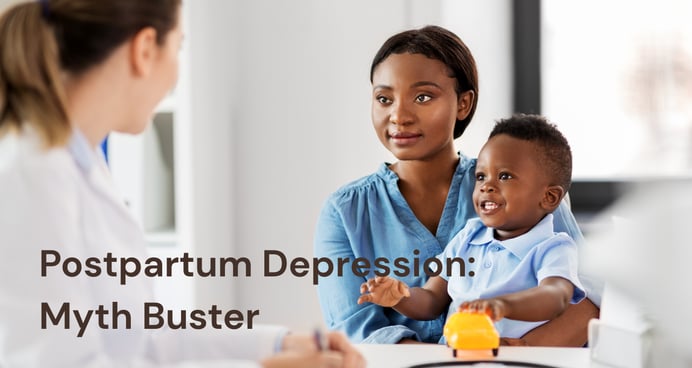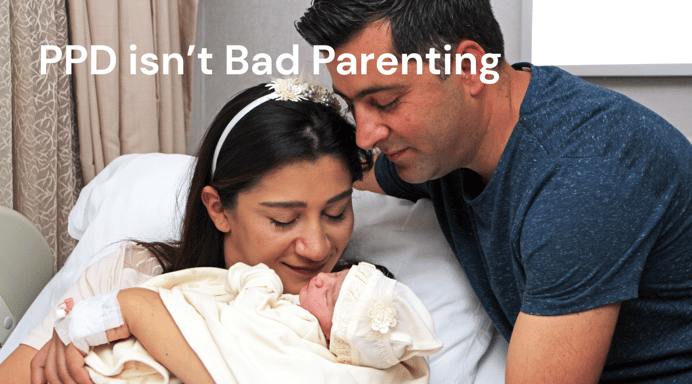Myths and Facts About Postpartum Depression
6/8/20254 min read


Postpartum depression (PPD) affects thousands of families each year, yet myths and misconceptions still cloud public understanding of this very real condition. Too often, women (and men) are left confused, ashamed, or in denial—fearing judgment, misunderstanding, or isolation.
But the truth is, postpartum depression is common, treatable, and not your fault. Breaking down the myths and highlighting the facts can not only help people recognize the signs sooner—it can save lives.
At Peace Temple, we believe that knowledge is one of the most powerful tools in supporting new parents. Here’s a deep dive into some of the most persistent myths about postpartum depression—and the truth behind them.
Myth 1: Postpartum Depression Is Just the Baby Blues
Fact: While the “baby blues” are common and typically resolve within two weeks, postpartum depression is a serious mood disorder that can last months or longer if left untreated.
The baby blues affect up to 80% of new mothers and are characterized by mood swings, irritability, and weepiness. PPD, on the other hand, involves more intense symptoms like persistent sadness, anxiety, difficulty bonding with the baby, or even thoughts of self-harm.
If symptoms last more than two weeks or interfere with daily life, it’s time to consult a professional. Peace Temple’s postpartum therapists are trained to help differentiate between normal adjustment and clinical depression.
Myth 2: PPD Only Affects Mothers
Fact: Fathers and non-birthing partners can also experience postpartum depression.
Studies show that up to 1 in 10 fathers may develop symptoms of depression in the first year after their child’s birth. Their symptoms may look different—more irritability or withdrawal than sadness—but the emotional impact is just as real.
Peace Temple’s family-focused approach includes support for both mothers and fathers, recognizing that postpartum mental health is a shared journey.
Myth 3: PPD Happens Immediately After Birth
Fact: Postpartum depression can develop any time within the first year after childbirth.
While some people experience symptoms within days or weeks of delivery, others may not notice signs until months later—especially after returning to work, facing sleep deprivation, or encountering added stress.
This delayed onset is one reason many parents dismiss their feelings or think it’s “too late” to be postpartum depression. It’s never too late to seek help. If something feels off, trust that instinct and reach out to a mental health provider.
Myth 4: If You’re Bonding with Your Baby, You Can’t Have PPD
Fact: Many individuals with postpartum depression still feel deeply connected to their baby—but also overwhelmed, anxious, or hopeless.
PPD doesn’t always mean a complete emotional disconnect. Some mothers report feeling enormous love for their child alongside a persistent inner darkness. Others may feel anxious about the baby’s safety, obsessively checking in or unable to sleep even when the baby is resting.
The presence of bonding does not rule out depression. At Peace Temple, our assessments explore the full spectrum of emotional and behavioral changes—not just textbook symptoms.
Myth 5: PPD Means You’re a Bad Parent
Fact: Postpartum depression is a medical condition—not a reflection of character, competence, or love.
Feeling depressed after having a baby doesn’t mean you’re failing. In fact, acknowledging these feelings and seeking help is one of the most powerful acts of love a parent can offer their child. It takes strength—not weakness—to admit when you need support.
Every parent deserves compassion and care. Peace Temple’s postpartum care model is built on this core belief.


Myth 6: Medication Is the Only Solution
Fact: While medication can be effective for many, PPD is treatable through a variety of approaches—including therapy, support groups, nutrition, exercise, and mindfulness practices.
Treatment should always be personalized. Some parents benefit from talk therapy alone; others might need medication, lifestyle adjustments, or peer support. The best outcomes often come from integrated care, tailored to the person’s unique circumstances.
Peace Temple’s therapists offer holistic, evidence-based care plans that consider both clinical and personal needs.
Myth 7: You Have to Wait Until It’s “Severe” to Ask for Help
Fact: You don’t need to hit rock bottom to deserve support. Early intervention leads to faster recovery.
Many parents wait too long, hoping things will improve on their own or fearing they’ll be judged. But postpartum depression, like any illness, is easier to manage in its early stages.
Whether you’re feeling a little off or completely overwhelmed, Peace Temple welcomes you exactly where you are—with empathy, not expectation.
Myth 8: Talking About PPD Will Lead to Losing Custody of Your Child
Fact: Seeking help for postpartum depression does not mean you are unfit to parent.
This fear—though common—is rooted in stigma and misinformation. In reality, asking for help is viewed positively by healthcare providers. It shows that you’re proactive, responsible, and committed to your well-being and your child’s.
Therapists at Peace Temple offer confidential support, focused on healing—not punishment or judgment.
Myth 9: PPD Only Happens After the First Child
Fact: Postpartum depression can occur after any pregnancy—first, second, or fifth.
Even if you had a smooth emotional transition with a previous child, every pregnancy and postpartum experience is different. Changes in life circumstances, stress levels, hormones, or health can all influence your mental state.
At Peace Temple, we frequently work with parents who are surprised by postpartum depression after previously “easy” transitions. Each experience is valid and deserves care.
Final Thoughts: Truth Clears the Path to Healing
Postpartum depression is already hard enough without the weight of misunderstanding. Myths can delay diagnosis, increase shame, and isolate parents who are simply trying to make it through each day.
By separating fact from fiction, we make it easier for new parents to access the care they need—without guilt, without fear, and without shame.
If you or someone you know is struggling, know this: You are not alone. You are not broken. You are not to blame.
Peace Temple is here to walk with you—through the confusion, the fear, and toward the healing.
